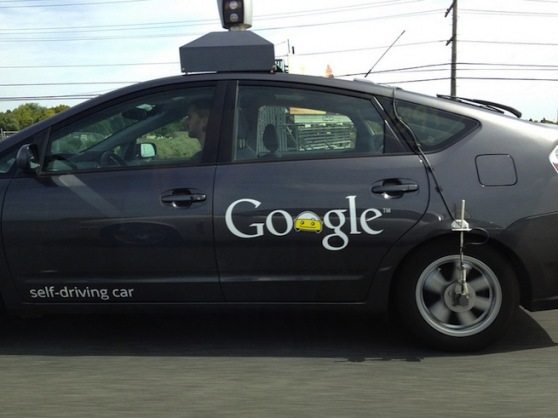Self-driving cars: Are Americans ready to give the keys to a computer?
Does the idea of a self-driving car inspire more dread or relief with you? Some drivers are afraid of relinquishing control of the vehicle to a computer. Those in favor of autonomous vehicles say that the benefits – in terms of accidents, fuel, congestion, and dollars – are immense.
Under a pilot program, Volvo and the Swedish government are partnering to bring 100 driverless cars to Sweden’s roads. At the same time, all 50 states in the U.S. have the authority to decide how to treat autonomous vehicles within their borders, so matters are more complicated in America.

Google’s self-driving car. Image by Saad Faruque
Different states are at different stages
The District of Columbia and 17 states including California, Nevada, and Florida have begun preparing for driverless cars with legislation. However, the National Highway Traffic Safety Administration (NHTSA) says that states should leave safety standards on federal regulators.
“We can’t build different cars for each state, based on different standards,” says Dan Gage, director of communications for the Alliance of Automobile Manufacturers, which represents 12 large auto manufacturers including General Motors and Toyota.
The laws only permit companies to test their autonomous vehicles on private roads and then on public roads. Later, once it’s commercially feasible and the technology has been proven, the states and the U.S. Department of Transportation are expected to pen laws permitting a citizen to operate an autonomous vehicle.
Legislating autonomous vehicles is challenging
Many knotty issues confront state legislators. “The first one that popped into my mind was DUI and drunk driving. Are you impaired if you are drunk and just programming the vehicle?” says Senator Mike Kowall, primary sponsor of Michigan’s autonomous vehicles bill, which was approved recently.
Most states assume that a driver is in control of the vehicle and laws are written accordingly. All such laws will require reviewing, which looks like a tall order, given that most states’ vehicle codes have over 40,000 provisions that will have to be revisited.
Autonomous vehicles will also impact city planning. A shuttle system could become a reality in most places. This Volvo project (“Drive Me”) in Sweden also aims to show the infrastructure that will be required once thousands of self-driving cars are on the roads:
Many working to make self-driving cars a reality
Besides Google, Bosch is working on an autonomous vehicle system. Among car manufacturers, General Motors and BMW are also working on adding self-driving cars to their portfolios. (Google cars in Nevada already have special license plates.)
Both Google and Volvo plan to introduce driverless cars in 2017. It’s expected that driverless cars will become a reality in the U.S. by 2025.
Category: Automotive, Driving, Traffic law















